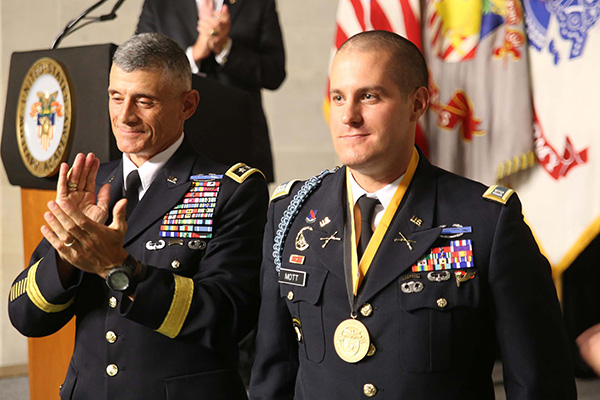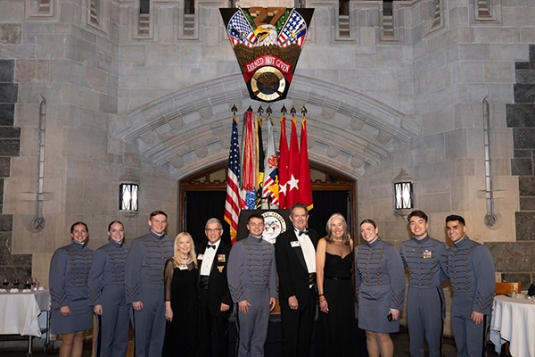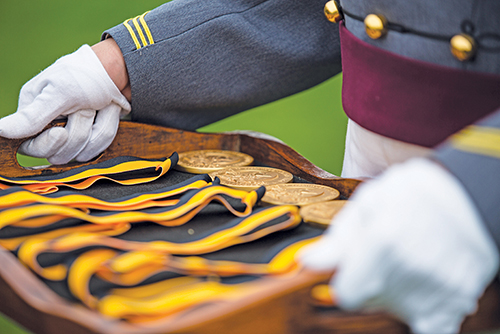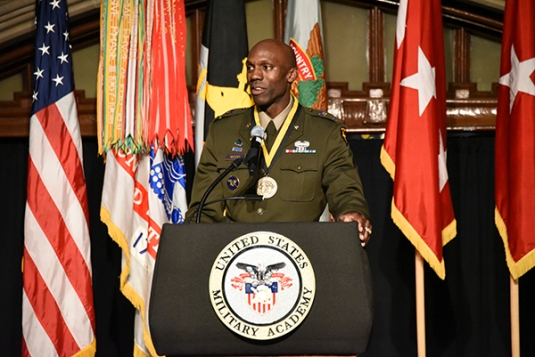Like thousands of graduates before him, CPT Kevin W. Mott ’07 accepted an offer to attend the United States Military Academy at West Point because he “wanted to make a difference.” What a difference he has made, especially while fighting in Afghanistan as a platoon leader with the 2nd Battalion, 327th Infantry Regiment (“No Slack”), 101st Airborne Division during Operation Strong Eagle III. Anticipated to last just a few days, this mission to clear an insurgent stronghold in the Kunar Province turned into a nine-day battle against a well-fortified enemy. “Their command and control ability was amazing,” said Mott. “Before we moved down the mountain to clear the Kalats, they mobilized unseen into the hills and spread out across 10-15 kilometers worth of terrain.”
On the first day of the mission, March 27, 2011, his unit was ambushed as soon as it lost its air support after a storm moved into the valley. Eleven soldiers in his platoon’s lead section were cut off and under heavy fire from all directions. Three were shot. Mott radioed in the casualties. He then put himself in the line of enemy fire so that his pinned fire team could move to a better position. Finally, getting to a position where he could see the enemy (less than 50 meters away), he called in indirect fire, effectively suppressing the enemy. “This went on for nine days,” said Mott, “with something bad happening in the mission every day.”
For his actions during Operation Strong Eagle III, Mott received a Silver Star, which MG Dana J.H. Pittard ’81, Commander of the 1st Armor Division, pinned on Mott a week before his third deployment to Afghanistan as the assistant operations officer for the 3rd Battalion, 41st Infantry Regiment, 1st Armored Division. “You may be wondering what our warrior ethos looks like,” Pittard told those in attendance at the ceremony. “Well, I can tell you that it’s personified by this man, CPT Kevin Mott.”
Lieutenant General Robert L. Caslen ’75 echoed Pittard’s words to the Corps during his Superintendent’s introduction of Mott at the 2014 Nininger ceremony held in the Mess Hall. Caslen also told the cadets that Mott had been wounded during his first deployment in Afghanistan just nine months prior to the events for which he was receiving the Nininger Award—he was shot in the head and fell down a ravine, suffering four fractured vertebrae, a broken rib, a broken ankle and a torn shoulder ligament, and needing 50 sutures and staples to close the wound in his head. “Not hesitating to act and step forward into harm’s way to fight alongside his Soldiers, Mott is truly an incredible leader who embodies the values of the United States Military Academy and the Army,” Caslen said.
In his acceptance speech, Mott focused on the “grit, loyalty and sacrifice” of his Soldiers, highlighting two who paid the ultimate sacrifice. “He didn’t talk about himself at all,” said CDT Aaron Pell ’15. “The Corps should be inspired that, in spite of the fact this award is about his valor and his action, his remarks were all about his Soldiers and how their memory keeps him going.”
Mott also directly addressed the cadets in his speech. “I would like you to know that West Point does prepare you to lead Soldiers into combat,” he told them. He also told them to trust their future non-commissioned officers: “Today’s NCOs are intelligent and experienced…and will take pride in helping you become a great lieutenant.” Finally, and perhaps most important, Mott encouraged the cadets not to settle for mediocrity. “The great Americans we call Soldiers are our Nation’s sons and daughters,” he said. “They deserve the very best training, equipping and inspiration you can muster.”
The Corps took Mott’s lessons to heart. Speaking about overcoming mediocrity in leadership, CDT Joshua Olivas ’16 said, “It’s something about which we hear quite often as cadets, but it is good to be reminded that leading our Nation’s sons and daughters is an honor and a privilege, and that they and their families deserve our very best.”
Presented by the West Point Association of Graduates and endowed by E. Douglas Kenna ’45 and his wife Jean, the Nininger Award is named for Second Lieutenant Alexander R. Nininger ’41, who fought the enemy to his death during the Battle of Bataan in January 1942 and posthumously received WWII’s first Medal of Honor. In addition to recognizing the recipient for his or her bravery as an individual, WPAOG regards the recipient as a given year’s representative for all West Point-commissioned officers who have heroically led Soldiers in combat.
Part of Captain Kevin Mott’s story was featured in the documentary The Hornet’s Nest. Watch the trailer here.
Speech

Acceptance Remarks
Washington Hall, West Point, New York
September 18, 2014
General and Mrs. Caslen, Ms. Houlihan, Colonel and Mrs. McClure, distinguished guests, and the Corps of Cadets, thank you for this honor. I am grateful to receive the Nininger Award. I do so mindful of West Point’s true heroes: My classmates Mike Giordano, Dan Hyde, Tyler Parten, Sarah Knutson-Cullen, Jason Jones, David Lodwick, Andy Caldwell, Ian Morrison, and Sean O’Connor, as well as my Plebe Chris Goeke, and my friends Daren Hidalgo, and Dimitri Del Castillo.
I remember them all this evening.
Preparing these remarks, I was thinking that the Army can be a small place. For example, Captain Stephen Tangen, the 2012 Nininger Award recipient, and I served in the same Infantry company. In fact, I called fire missions to support his platoon during the operation he described in his Nininger Award acceptance remarks.
Another Nininger Award recipient, CPT Nick Eslinger has been my best friend since our days at West Point. We were B-1 Barbarians together. During the patrol that Nick described in his acceptance speech, I was on the radio as Nick’s platoon sergeant reported their contact with the enemy.
So, to begin my remarks, I would say that you all should anticipate your lives will intersect in the future with friends, teammates, and classmates you met here. This evening, however, I would like to focus on the grit, the loyalty, and the sacrifice of my Soldiers. They rose to the challenge, as your Soldiers will. You see, American Soldiers just want to fight, win, and take care of each other in the process. These great Americans we call Soldiers come from all walks of life. I would like to tell you about two who made a great impact upon me.
The first was Specialist Jameson Lindskog. He grew up in Pleasanton, California. Ironically, he had started a massage therapy business before changing plans and joining the Army as a combat medic. Just three weeks before my unit was due to leave Afghanistan, Jameson was assigned to my platoon.
The second was Sergeant First Class Ofren Arrechaga, and he was a great NCO. He was also a husband and the proud father of son Alston and daughter Tristian. He had served in the 101st Airborne Division for 10 years and was excited about PCSing to Fort Benning after our deployment ended. SGT Arrechaga was looking forward to becoming a Ranger Instructor. With a big smile, he would often tell me about his plan to attend jumpmaster school.
The valor of these two in operation Strong Eagle III was truly remarkable.
The operation began the night of 27 March 2011. We were the lead platoon in our battalion’s mission to clear an insurgent stronghold two kilometers from Pakistan. Helicopters set us down in the mountains at an altitude of 9,000 feet. It was pitch dark, and the terrain was so steep we couldn’t navigate down the slopes. We knew we were in a bad place, but did not know how bad. As we set up security, I heard broken radio traffic about casualties on a nearby objective. That’s never a good sign.
At first light, we moved out and began clearing mud huts called Kalats. Ominously, there were no Afghan men to be seen in the area. We were bounding by section because we expected enemy contact. SGT Arrechaga and his section led the way, as they always did. We quickly found a large cache of arms and stopped to record them and destroy them in place. SGT Arrechaga and his Soldiers continued, while my headquarters element cataloged the arms we had found. Then, a storm moved into the area, and our air support vanished. It was replaced by pelting cold rain, hail, and sleet.
Enemy fire erupted all over the valley. SGT Arrechaga and the lead section advanced to the next set of buildings. The 11 soldiers in his section were under fire from all directions. My element was also taking heavy fire. About 10 minutes into this first firefight, a garbled radio transmission about three casualties came over the platoon net. Several NCOs and Specialist Lindskog ran forward to support SFC Arrechaga’s section, which desperately needed help. Enemy machine guns rained fire upon them, bullets snapping branches above their heads, forcing them to jump from the trail and tumble downhill. Somehow, Specialist Lindskog’s relief team landed near the ambushed section. They found that SFC Arrechaga had been shot in the lower back, and the alpha team leader had been shot in the arm while pulling Arrechaga to the shallow cover. The Bravo Team Leader helped pull them both back. Then, he took over, directing fire. The wounded Team Leader bandaged his arm and shouted encouragement to the pinned down Soldiers as he returned fire.
As I radioed for help, SPC Lindskog took care of SGT Arrechaga and the wounded team leader, and he began caring for several wounded Afghan National Army Soldiers. Another NCO was treating an Afghan Soldier when that NCO was shot in the chest. Fortunately, his body armor stopped both rounds. He sat up, returned fire, and ran back to the line to mark targets with his grenade launcher. Specialist Lindskog then began treating that same wounded Afghan. Moments later Lindskog was shot above his side body armor plate. Slumped over to the side, he instructed the NCOs, telling them how to take care of him while he directed medical care for other casualties. After about 30 minutes, he apologized for not being able to fight anymore and he died. He actually apologized for dying.
Waiting for MEDEVAC, SGT Arrechaga encouraged the other Soldiers, making jokes about how long it was taking the MEDEVAC helicopter to arrive. He asked us, “What the hell was taking so long?” and told us to “Tell Pedro to hurry up!” It had been well over an hour. In that time, we had witnessed a MEDEVAC helicopter get raked with machinegun fire as the chopper hovered above us. As we watched the MEDEVAC helicopter fly off without picking up any of our wounded Soldiers, morale slumped to a new low.
Ultimately, Arrechaga would be MEDEVAC’d, and he did survive his first surgery. However, in recovery he destabilized. As the doctors tried to save his life, he passed away.
There were nine more days of such valor. Every NCO in my Platoon was wounded except for one. The pattern repeated itself: slug through the huts under small arms fire from all directions, and run through machine gun and RPG fire to help each other. Through it all, my Soldiers never quit. Eventually, we cleared our sector of the stronghold, but we also continuously took care of each other. Everyone lived the shared principle: the mission, the men, then me. Knowing that we all lived that code is what kept us going. It will keep you going too.
There is a chance that your first unit will not deploy into combat, but I would not rule out the possibility. The world continues to be a dangerous place with conflicts escalating daily. Given that uncertain future, I would like you to know that West Point does prepare you to lead Soldiers into combat. Attention to detail, the ability to multi-task, and the drive to work outside your comfort zone are all traits you possess. They are in your professional DNA. Some of the tasks, inspections, and knowledge required here at West Point may seem pointless, but you’ll understand later that the process of doing these tasks has served you well.
Your non-commissioned officers will help you refine these traits. Today’s NCOs are intelligent and experienced. Trust them. Rely on them.
Furthermore, they will see you as a reflection of themselves. They will take pride in helping you become great lieutenant, as my platoon sergeant, SFC Michael McCorkendale, and my first sergeant, CSM Randy Wright, did for me. They will tease you, but that is how you will know they consider you a member of their team. In fact, CSM Wright used to fishhook all of us lieutenants and make jokes as he squared us away. I guarantee, you will take pride when you hear them refer to you as My Lieutenant. There is no greater honor.
Above all, I encourage you not to settle for professional mediocrity. The great Americans we call Soldiers are our nation’s sons and daughters. Like you, they volunteered to fight unseen, ruthless enemies on dark mountaintops to keep us safe back home. They deserve the very best training, equipping, and inspiration you can muster. You will be responsible for Fathers, Mothers, Brothers, Sisters, sons and daughters. Never settle for mediocrity.
General Caslen, Ms. Houlihan, and Colonel McClure, on behalf of my family and my Soldiers, I would like to thank the Academy and the Association of Graduates for this honor. And to the Corps, thank you for this great evening.
No Slack . . . and, as always, Beat the Hell out of Navy!





